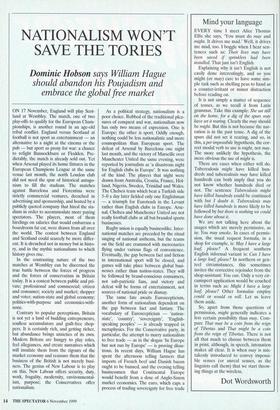Mind your language
EVERY time I meet Alice Thomas Ellis she says, 'You must do may and might. It drives me mad.' Well, it drives me mad, too. I boggle when I hear sen- tences such as: Their lives may have been saved if sprinklers had been installed. That just isn't English.
Explaining why it isn't English is not easily done interestingly, and so you might (or may) care to have some sim- ple task such as shelling peas to hand as a counter-irritant or minor distraction before reading on.
It is not simply a matter of sequence of tenses, as we recall it from Latin grammar. Take this example: She sat still on the horse, for a dig of the spurs may have set it rearing. Clearly the may should be might. But this is not because the nar- ration is in the past tense. A dig of the spurs did not set it rearing, and so, in this, a per impossibile hypothesis, the cor- rect modal verb to use is might, not may. The more unlikely the hypothesis, the more obvious the use of might is.
There are cases when either will do. Tuberculosis might have killed hun- dreds and tuberculosis may have killed hundreds can both imply that you do not know whether hundreds died or not. The sentence Tuberculosis might have killed hundreds could be continued with but I doubt it. Tuberculosis may have killed hundreds is more likely to be followed by but there is nothing we could have done about it.
We are not talking here about the usages which are merely permissive, as in: You may smoke. In cases of permis- sion, the usual request formula, in a shop for example, is: May I have a large loaf, please? A frequent southern English informal variant is: Can I have a large loaf, please? In northern or gen- teel circumstances, this sometimes invites the corrective rejoinder from the shop-assistant: You can. Only a very cir- cumspect application would be couched in terms such as: Might I have a large loaf, please? Other formulas employ could or would or will. Let us leave them aside.
So, apart from those questions of permission, might generally indicates a
less certain possibility than may. Com-
pare That may be a coin from the reign of Tiberius and That might be a coin from the reign of Tiberius. There is not all that much to choose between them in print, although, in speech, intonation makes all clear. It is when may is mis- takenly introduced to convey impossi- ble senses (or unreal senses, as the linguists call them) that we start throw- ing things at the wireless.
Dot Wordsworth


























































































 Previous page
Previous page